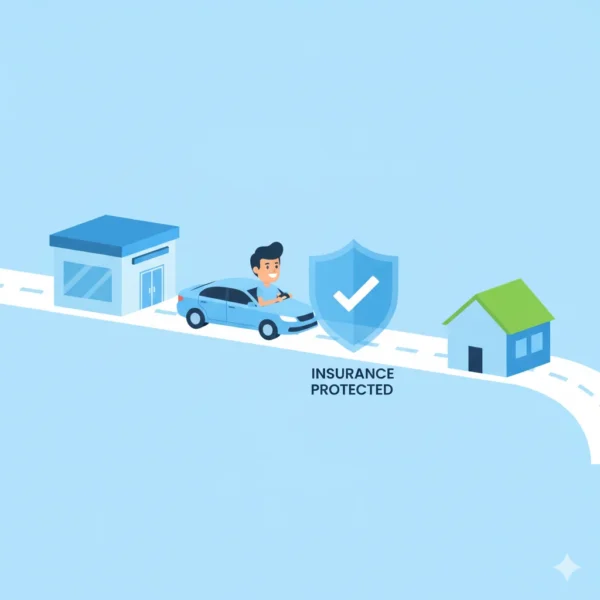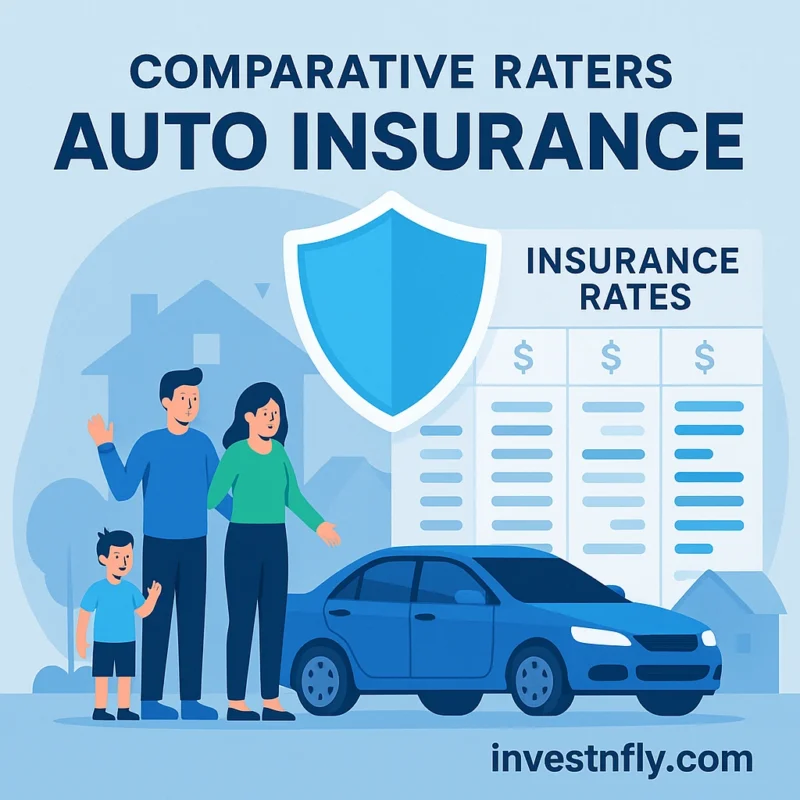Introduction

Buying a new car is one of the most exciting milestones in life — the smell of a fresh interior, the shine of new paint, and the thrill of ownership. But hidden beneath the excitement lies one of the most overlooked questions: “Am I legally and financially protected the moment I drive this car off the lot?”
Most first-time buyers assume that their permanent insurance kicks in immediately or that the dealership provides some kind of safety net. In reality, this isn’t always the case. Standard auto policies often take 24–72 hours to activate, and dealerships may not include temporary coverage unless specifically arranged.
This gap is where driveaway insurance becomes essential. It’s a short-term policy designed for new buyers, ensuring compliance with state laws and protection against accidents, theft, or liability during the initial days.
👉 For the basics of driveaway coverage, see our full guide: Driveaway Insurance in USA 2025.
Why Do New Car Buyers Need Driveaway Insurance?
Legal Compliance
Nearly every US state mandates proof of liability insurance before a vehicle can be driven on public roads. Even if you’ve just signed the paperwork, driving uninsured exposes you to:
- Fines ranging from $100 to $500 (varies by state)
- License suspension
- Registration denial
For example, the California DMV states that proof of insurance must be shown before registration is completed.
Insurance Activation Gaps
Even if you’ve contacted your insurer in advance, policies may not activate instantly. Some carriers require a 1–3 business day processing period. A weekend purchase may leave you exposed until Monday.
Dealer Requirements
Dealers often insist on proof of insurance before releasing the vehicle. While some offer “dealer plates” or bundled short-term cover, these can be expensive and restrictive.
Peace of Mind
Driving a brand-new car through city traffic or on highways is already stressful. Knowing you have immediate coverage lets you focus on enjoying the first ride rather than worrying about financial risks.
👉 For a detailed breakdown of daily and weekly pricing, check: Driveaway Insurance Cost in USA.
How Long Does Driveaway Insurance Last?
Driveaway insurance is designed to be flexible. Most providers offer coverage options like:
- 1 Day – For buyers driving locally from dealership to home
- 7 Days – Ideal for interstate buyers or buyers waiting for insurer activation
- 14 Days – Best for those managing financing, DMV registration, or title transfers
Average Costs by Vehicle Type
| Duration | Economy Car | Standard Sedan | SUV/Truck | Luxury Vehicle |
|---|---|---|---|---|
| 1 Day | $30–$40 | $40–$50 | $50–$65 | $70–$80 |
| 7 Days | $150–$200 | $180–$250 | $220–$300 | $300–$400 |
| 14 Days | $280–$350 | $320–$420 | $380–$500 | $500–$650 |
📌 According to the Insurance Information Institute, short-term policies cost more per day than annual coverage but are cheaper overall for short durations.
Driveaway Insurance vs Dealer Coverage
New buyers often confuse dealer-provided temporary coverage with independent driveaway policies. Here’s how they differ:
| Feature | Dealer Coverage | Driveaway Insurance |
|---|---|---|
| Provider | Dealership | Independent insurer |
| Duration | 1–7 days, fixed | Flexible (hours–14 days) |
| Cost | Bundled or hidden | Transparent, $30–$80/day |
| Coverage | Limited liability | Full liability + damage |
| Control | Dealer sets terms | Buyer chooses provider |
👉 For in-depth comparison, see: Temporary Driveaway Insurance vs Dealer Coverage.
Best Driveaway Insurance Options for New Car Buyers
While many insurers provide car policies, only a handful specialize in short-term or driveaway coverage. Here are some leading names:
Tempcover
- Best For: Individual buyers needing same-day coverage
- Cost: $35–$75/day
- Pros: Fast online purchase, flexible durations
- Cons: Not ideal for dealers or fleets
Cuvva
- Best For: Younger drivers, app-based buyers
- Cost: $30–$70/day
- Pros: Hourly coverage available, easy app UX
- Cons: Limited state availability
Surefire Insurance
- Best For: Dealerships & fleets
- Cost: $40–$80/day, varies by fleet
- Pros: Multi-driver policies, strong dealer focus
- Cons: More paperwork
GoShorty
- Best For: Budget-conscious buyers
- Cost: $25–$60/day
- Pros: Cheapest option, fast online setup
- Cons: Limited coverage add-ons
IRMI
- Best For: Transporters handling out-of-state delivery
- Cost: $300–$600 per trip
- Pros: High liability, interstate legal protection
- Cons: Overkill for individual buyers
State Farm & Progressive Add-ons
Some large insurers (State Farm, Progressive) offer temporary riders for new buyers. These can be convenient if you’re already insured but need a coverage bridge.
👉 For a detailed review of all providers, see: Best Driveaway Insurance Providers in USA.
Mini Case Studies
Case 1 – Local Buyer
Alex in Ohio buys a sedan on a Saturday. His insurer won’t activate coverage until Monday. He buys a 2-day Tempcover policy for $60, drives home safely, and transitions to his main insurer on Monday.
Case 2 – Interstate Buyer
Maria in New York purchases a car in Pennsylvania. She buys a 7-day policy for $210, giving her time to complete registration and switch to long-term insurance.
Case 3 – Dealer Fleet Purchase
A dealership in Texas buys 10 vehicles at auction. Using Surefire’s fleet policy, they move all vehicles legally under one multi-driver plan.
Case 4 – Luxury Buyer
John purchases a $90,000 luxury SUV in Florida. He chooses a 14-day policy ($600) to ensure coverage while waiting for his permanent insurer’s underwriting approval.
Case 5 – Private Sale
Sarah buys a used car from a private seller in Arizona. Since her current insurer requires 3 days to update her policy, she uses a 3-day Cuvva policy for $120.
Common Mistakes New Car Buyers Make with Driveaway Insurance
- Assuming dealer plates = insurance – Plates cover registration, not liability.
- Relying blindly on grace periods – Not all insurers provide them, and state rules vary.
- Skipping temporary insurance on private sales – Risk is higher in private transactions.
- Choosing the cheapest plan blindly – Low-cost policies may exclude theft or damage.
- Not confirming state compliance – Some states mandate minimum liability limits.
Tips to Save Money on Driveaway Insurance
- Compare providers before purchase — prices vary by 20–30% for same coverage.
- Choose weekly instead of daily if you expect delays — per-day cost is cheaper.
- Bundle with dealer purchase if they offer discounts.
- Avoid unnecessary extras if you only need basic liability.
- Check if your main insurer offers riders — may be cheaper than standalone policies.
FAQs for New Car Buyers
Q1. Do temporary tags replace insurance?
No. Tags allow registration but liability coverage is still required.
Q2. How fast can I get driveaway insurance?
Many providers issue policies within 15 minutes online.
Q3. What if I buy on a weekend?
Driveaway insurance is especially helpful since permanent insurers may not activate until weekdays.
Q4. Does it cover accidents on the first drive?
Yes. Policies start at the chosen time and cover liability + damage.
Q5. Can I use it for out-of-state purchases?
Yes. Nationwide providers cover interstate travel, but confirm terms.
Q6. Is it useful for financed cars?
Yes. Lenders often require full coverage before release; a short-term plan bridges the gap.
Q7. Does it cost more than standard insurance?
Per day, yes — but overall it’s cheaper since you only pay for a few days.
Q8. What if I drive without coverage?
You risk fines, suspension, and uncovered accident liability.
Q9. Which providers are best for new buyers?
Tempcover, Cuvva, and GoShorty are common choices.
Q10. Do insurers check my credit for short-term policies?
Some do, but driveaway policies often have less strict checks.
Q11. Is theft included automatically?
No. Some providers only include liability unless theft is added.
Q12. Can I extend a policy?
Yes, most providers allow extensions before expiry.
Conclusion
For new car buyers, driveaway insurance is not optional — it’s essential. It ensures legal compliance, protects against financial loss, and fills the gap between car purchase and permanent coverage activation.
Whether you’re driving home from a local dealership, picking up a car across state lines, or waiting on financing approval, short-term coverage offers both peace of mind and legal protection.
👉 Explore more:


